The Social Well being Authority (SHA) and the Social Well being Insurance coverage Fund (SHIF) are a part of Kenya’s healthcare reform aimed toward attaining Common Well being Protection (UHC) by changing the Nationwide Well being Insurance coverage Fund (NHIF).
What’s SHA?
The Social Well being Authority (SHA) is the federal government company established to supervise and regulate Kenya’s new healthcare financing system. It replaces the Nationwide Well being Insurance coverage Fund (NHIF) and is chargeable for managing the brand new medical health insurance construction underneath the Social Well being Insurance coverage Fund (SHIF). Employers have been required to register their workers and their dependents with SHA by way of the SHA Employer Portal by October 1, 2024. The ultimate date for NHIF admissions was September 30, 2024.
What’s SHIF?
The Social Well being Insurance coverage Fund (SHIF) is the first medical health insurance scheme underneath SHA. It’s designed to make sure that all Kenyans, together with these within the casual sector and weak teams, have entry to reasonably priced and high quality healthcare.
To higher perceive the general public notion of Kenya’s new healthcare reforms, GeoPoll lately performed a survey on SHA /SHIF. The research sought to evaluate consciousness, understanding, and attitudes towards these initiatives, that are set to interchange the Nationwide Well being Insurance coverage Fund (NHIF) as a part of the federal government’s Common Well being Protection (UHC) technique.
Key Findings
Consciousness and Data Ranges
Notion of Accessibility and Affordability
SHA/SHIF Utilization
SHA/SHIF Challenges
Demographic Overview
The survey gathered suggestions from 961 respondents in Kenya. The individuals are of age 18 years outdated and above, with the most important share being between 25-35 years outdated (59%), and comprised 52% feminine and 48% male. A majority, (38%) are faculty diploma holders. As well as, 73% said that they reside in city areas whereas 27% dwell in rural areas.
Earnings
The survey outcomes indicated that a good portion of respondents (34%) earn lower than Kes. 10,000, adopted intently by 31% who fall inside the Kes. 10,001 – Kes. 30,000 earnings bracket. Moreover, 14% earn between Kes. 30,001 and Kes. 50,000, whereas 12% report earnings of Kes. 50,001 – Kes. 100,000. A smaller share, 7%, earn between Kes. 100,001 and Kes. 250,000, with solely 4% making greater than Kes. 250,000.
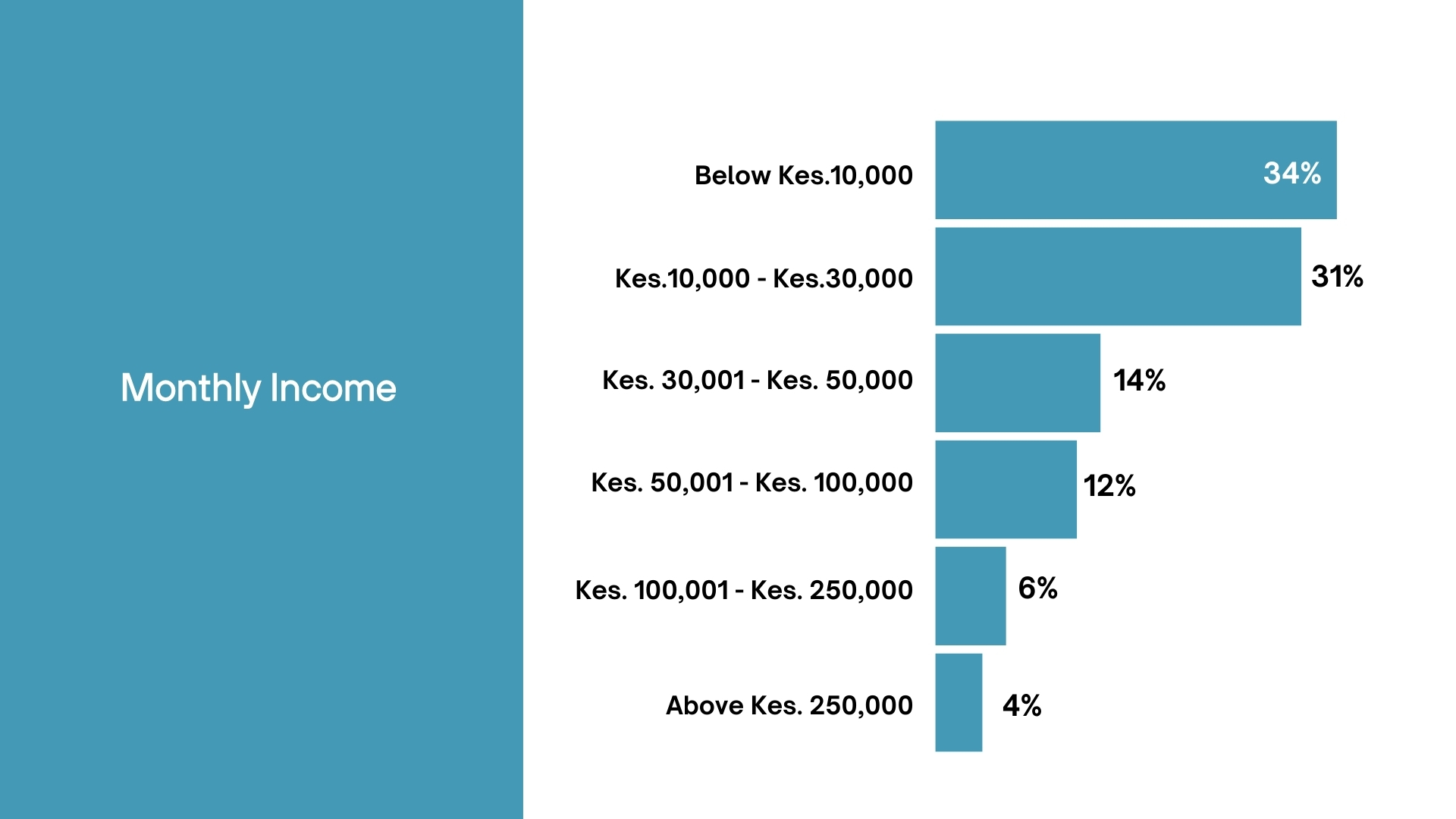
Consciousness and Data Ranges
Our survey confirmed that 95% of respondents are conscious of SHA and SHIF, whereas 4% have by no means heard of them. Amongst those that are conversant in SHA and SHIF, 34% have in depth information, 33% have some information, 26% have restricted information, and 4% haven’t any information in any respect.
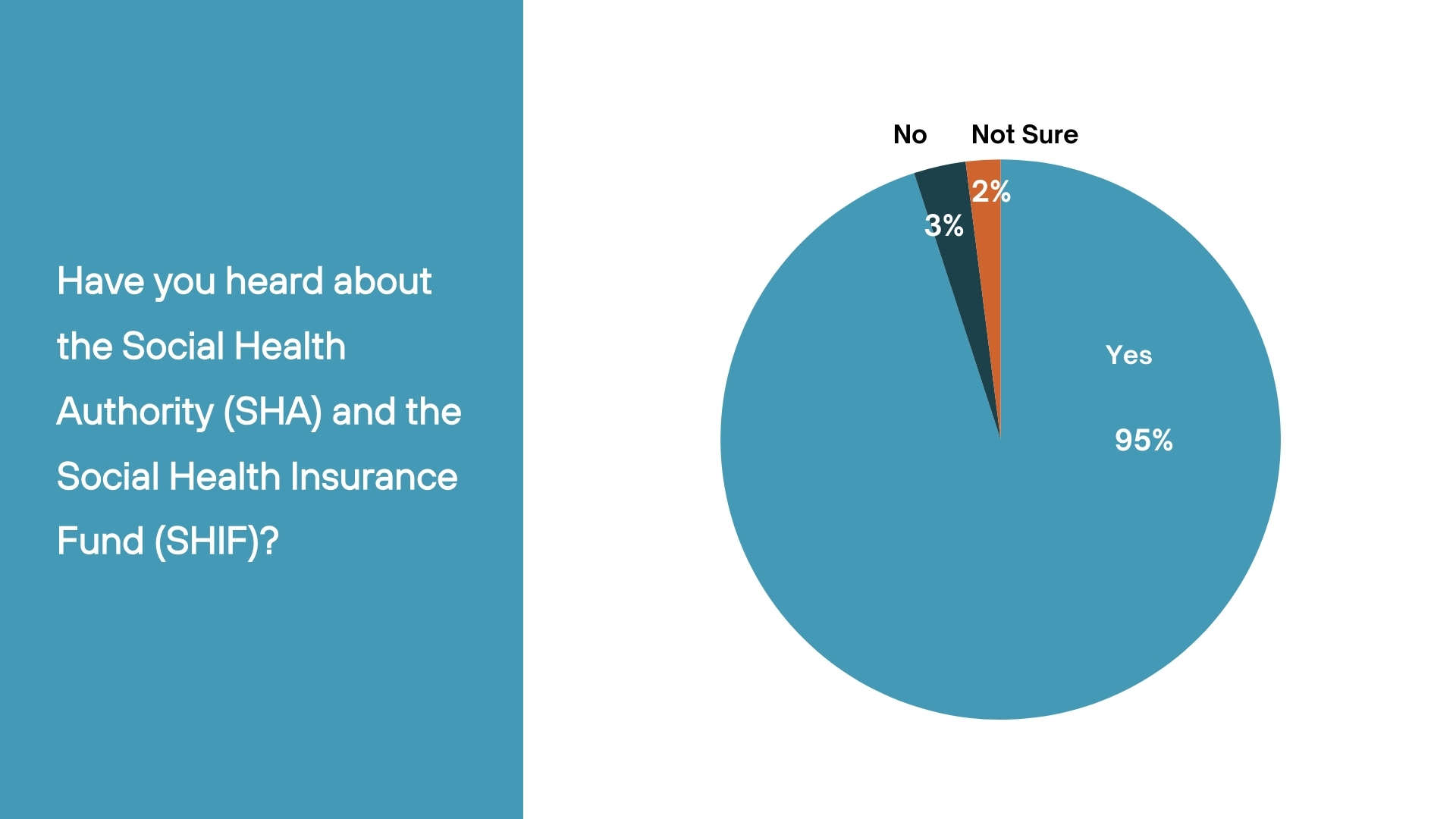
Supply of knowledge
Tv is the first supply of knowledge for respondents, with 27% indicating that they depend on it for updates about SHA and SHIF. Social media follows intently behind as the principle supply of knowledge for 25% of individuals. Radio can be a big channel, with 15% of respondents studying about SHA and SHIF by way of it. Moreover, 13% of individuals reported acquiring info from official authorities web sites. Phrase of mouth is one other necessary supply, with 10% of respondents listening to about SHA and SHIF by way of casual conversations, whereas healthcare suppliers, reminiscent of docs and nurses, are influential sources for one more 10% of individuals.
This distribution highlights a various mixture of conventional and digital communication channels that contribute to public consciousness of SHA and SHIF.
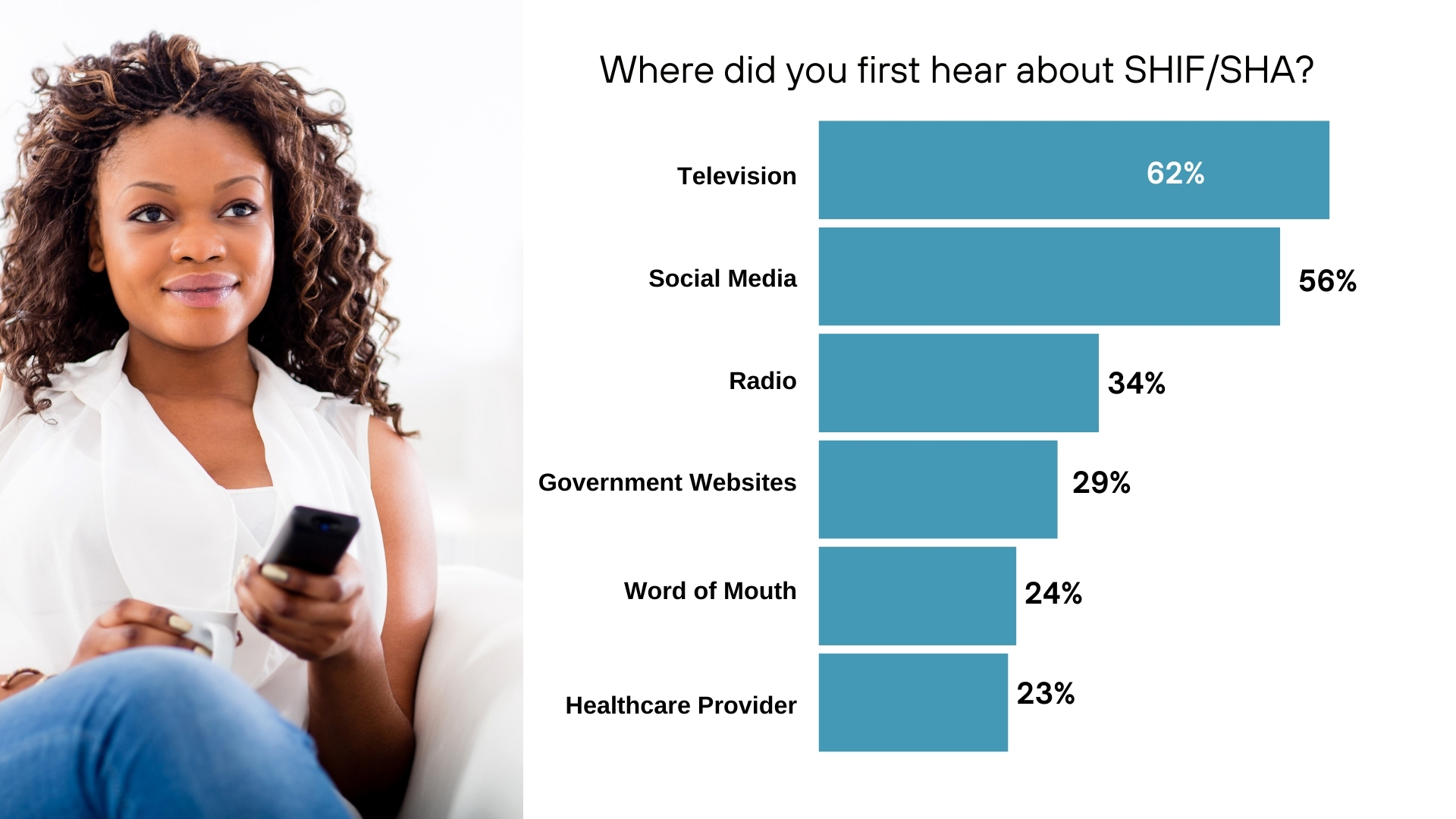
Do you perceive the aim of SHIF
A good portion of respondents, 38%, indicated that they’ve a considerably good understanding of SHIF. This means that whereas they’re conversant in the idea, they could not totally grasp all its particulars and nuances. Moreover, 27% reported having an excellent understanding of SHIF, indicating that they’re extremely educated about how the fund works, its advantages, and its function within the healthcare system.
Alternatively, 27% of respondents acknowledged having a restricted understanding of SHIF. This might point out an absence of clear or detailed info, or presumably confusion concerning its features and companies. Moreover, an 8% minority said that they don’t perceive SHIF in any respect, highlighting a big hole in information or consciousness. This hole may end result from elements reminiscent of restricted entry to info or communication boundaries.
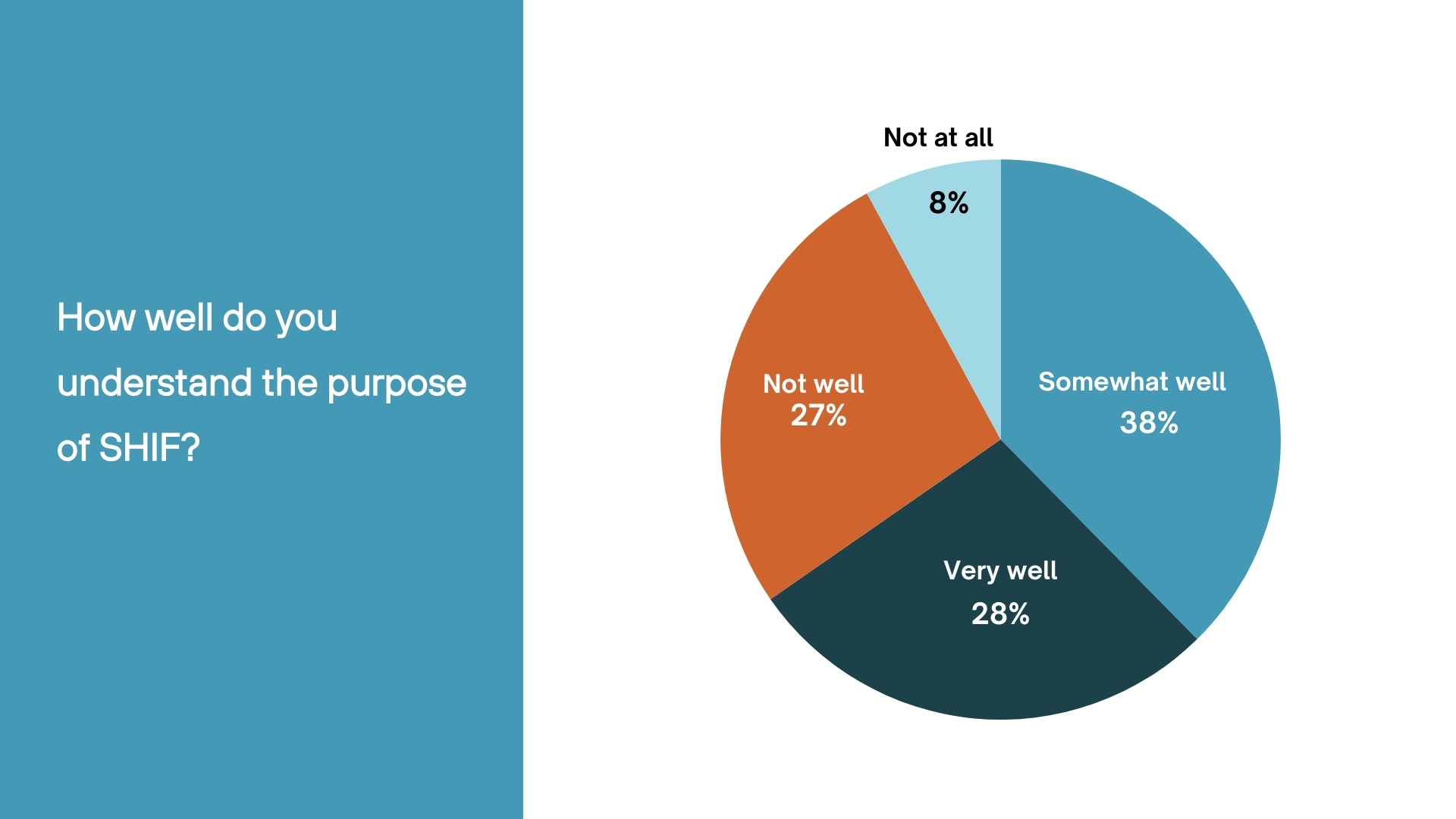
The Aim of SHIF
The survey revealed various perceptions in regards to the objective of SHIF. A major 35% of respondents imagine that SHIF is supposed to interchange NHIF with a more practical and improved insurance coverage mannequin. In the meantime, 28% view SHIF as a means to supply reasonably priced medical health insurance for people throughout all earnings ranges. Moreover, 22% of individuals see SHIF as a program designed to supply free healthcare to all Kenyans. Nonetheless, 10% of respondents have been uncertain about SHIF’s particular objectives, indicating a spot in consciousness or understanding.
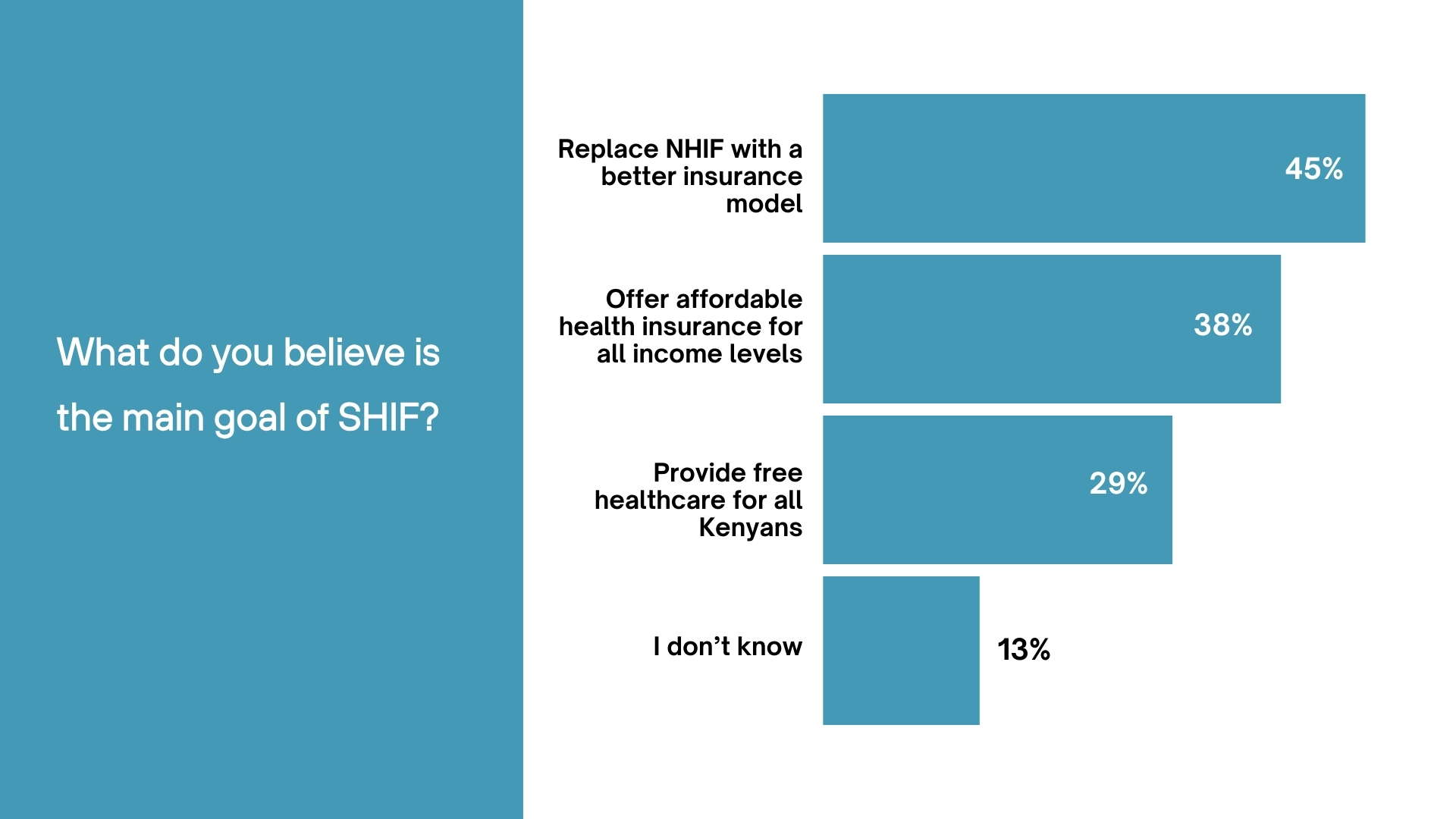
Expectations of SHIF
On this survey, we aimed to grasp the individuals’ expectations concerning the Social Well being Insurance coverage Fund (SHIF). Nearly all of respondents, 29%, indicated that they haven’t any particular expectations for SHIF. Shut behind, 23% expressed optimistic expectations, displaying a hopeful outlook for the fund’s future influence.
Moreover, 13% of respondents are optimistic that SHIF will result in improved healthcare companies, indicating a need for higher high quality and extra accessible healthcare choices. A smaller group, 5%, expects SHIF to outperform the Nationwide Well being Insurance coverage Fund (NHIF), suggesting a want for enhanced advantages or elevated effectivity. Lastly, 4% of individuals emphasised the significance of affordability, expressing hope that SHIF will present well being protection that’s financially accessible to a broader inhabitants.
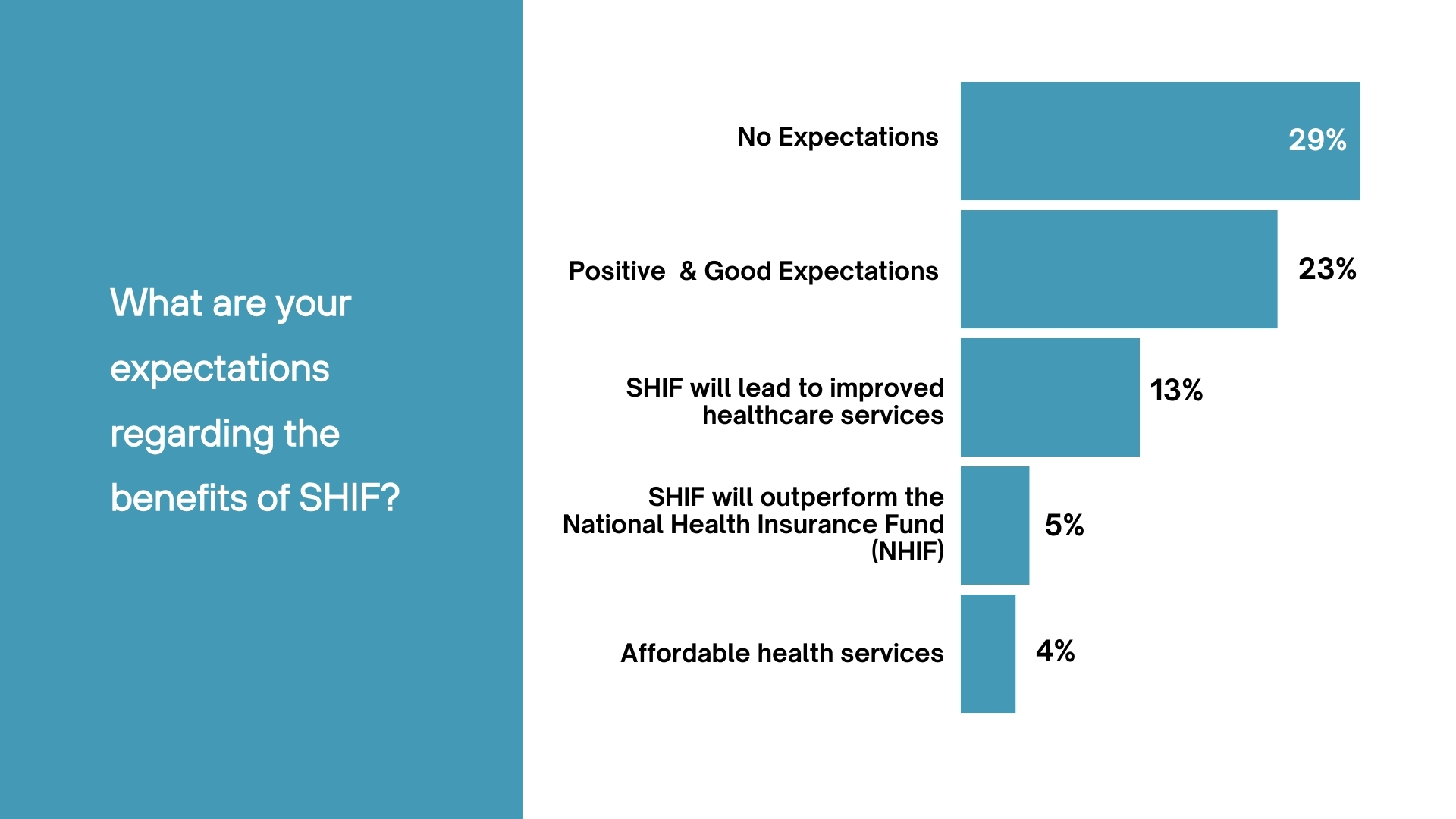
Enrolled to SHIF
In response to the survey, 60% of the individuals have registered for the Social Well being Insurance coverage Fund (SHIF), whereas 40% haven’t accomplished their registration.

Causes for not registering to SHIF
Amongst those that haven’t registered for the Social Well being Insurance coverage Fund (SHIF), 34% cited an absence of belief within the system as their major cause for not enrolling. Moreover, 26% expressed considerations about affordability. Moreover, 25% talked about that inadequate info was a barrier to registration, whereas 19% said a easy lack of curiosity. Some respondents (18%) reported dealing with difficulties through the enrollment course of, and 9% most popular non-public insurance coverage choices over SHIF.
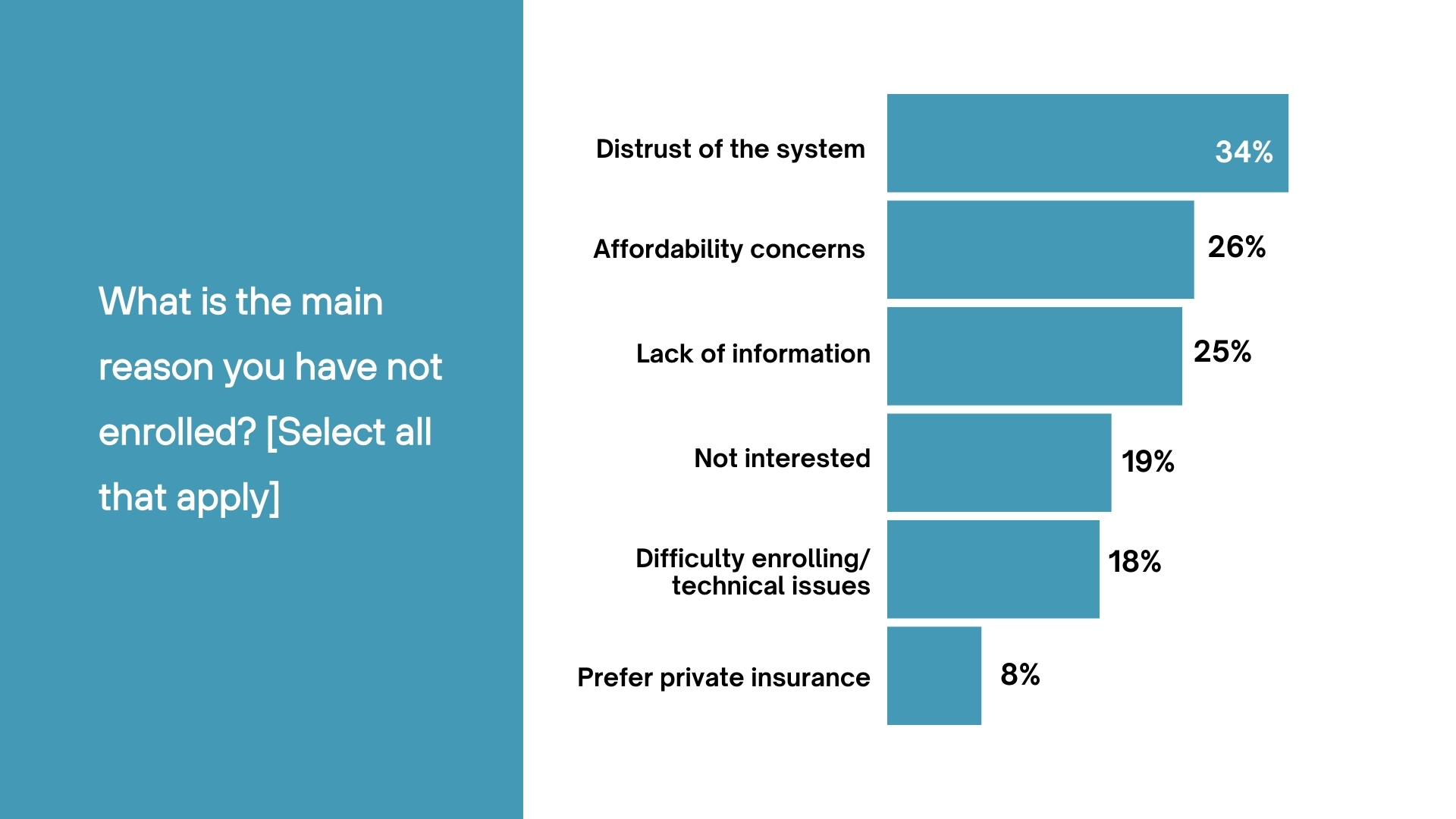
Utilization and Expertise of SHIF Amongst Enrolled Members
Of these enrolled within the Social Well being Insurance coverage Fund (SHIF), 63% reported that they haven’t but utilized their SHIF protection, alternatively, 37% have accessed the brand new insurance coverage companies.
Of those that have used SHIF, the suggestions on their expertise varies. A notable 29% expressed a impartial expertise, indicating neither satisfaction nor dissatisfaction with the companies offered. In the meantime, 23% reported a really poor expertise, highlighting considerations or dissatisfaction with the healthcare companies or advantages they obtained.
In distinction, 20% of customers shared that their expertise was good, suggesting {that a} portion of enrollees felt their expectations have been met. 16% rated their expertise as poor, pointing to areas of enchancment wanted. Nonetheless, 14% of respondents indicated that their expertise with SHIF was excellent, reflecting a optimistic outlook and satisfaction with the companies offered.
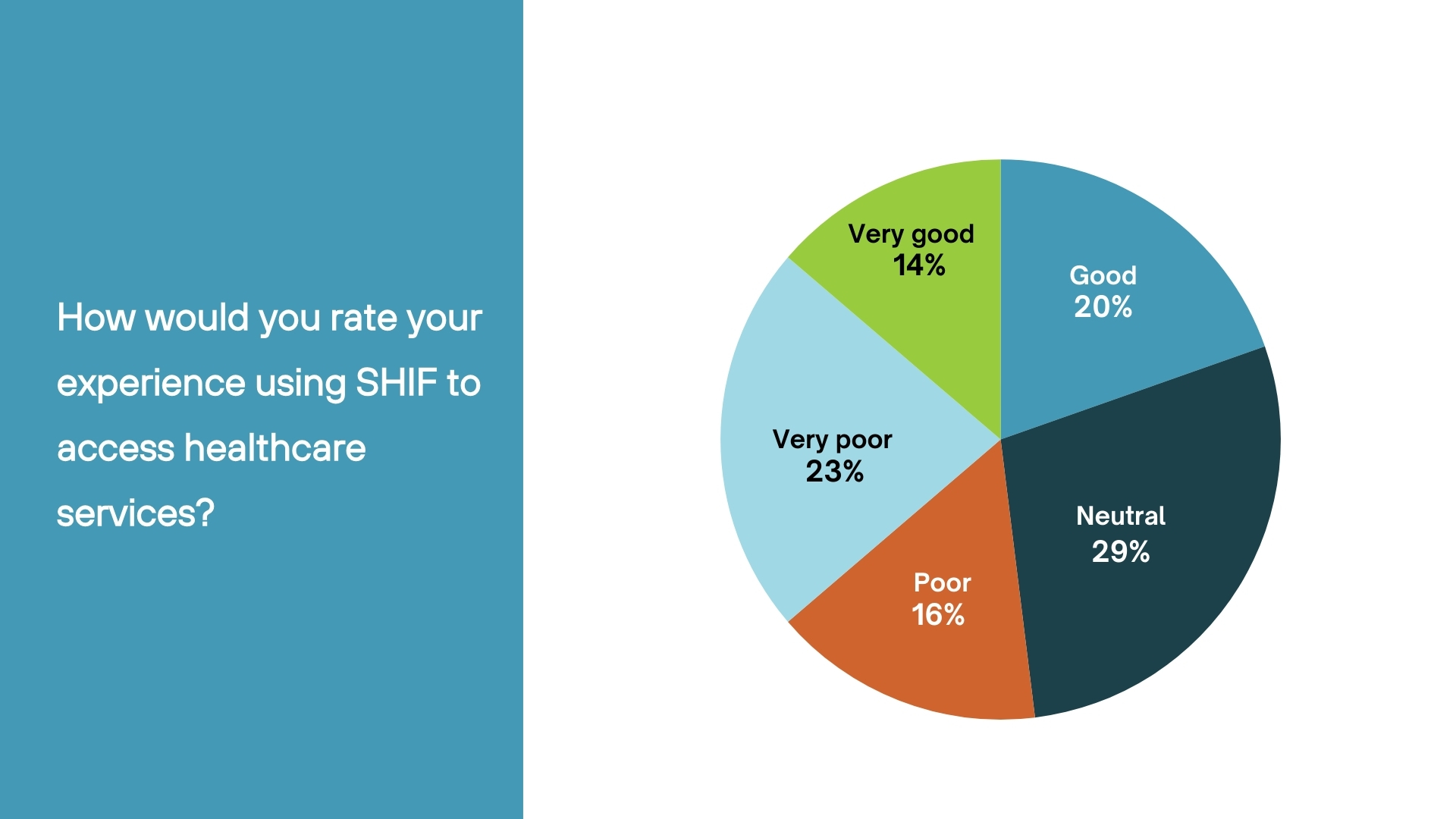
Healthcare companies to be prioritized underneath SHIF
Survey individuals recognized a number of healthcare companies that must be prioritized underneath the Social Well being Insurance coverage Fund (SHIF). The best precedence was given to emergency medical companies, which 70% of respondents highlighted as important. Following intently have been maternity and baby well being companies, valued by 68% of individuals. Moreover, 57% emphasised the necessity for improved administration of power illnesses. Normal outpatient companies and specialised care, reminiscent of most cancers therapy, have been deemed important by 56% and 54% of respondents, respectively. Moreover, 40% of individuals careworn the significance of preventive care and well being promotion, whereas 39% referred to as for a higher deal with psychological well being companies.
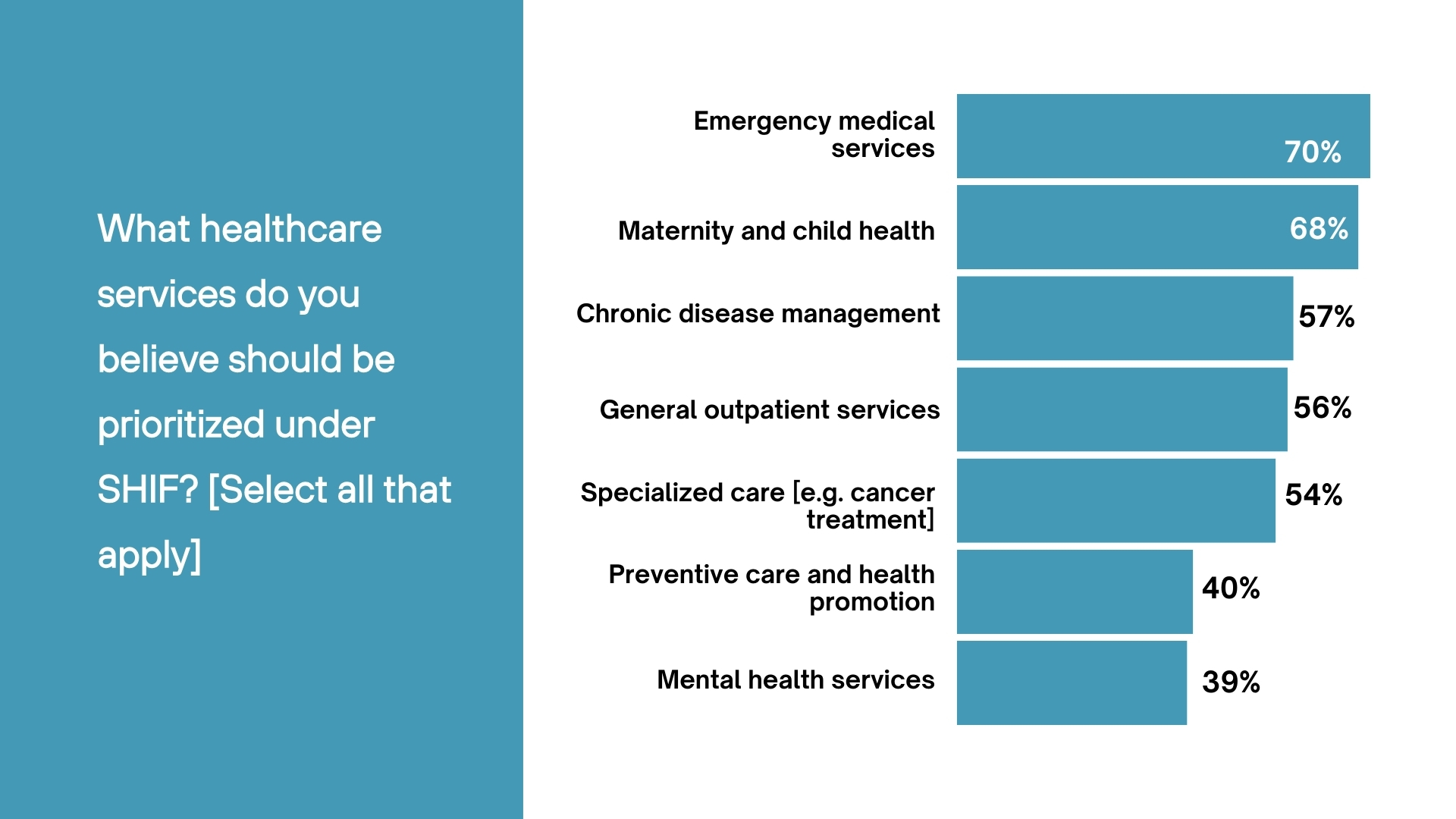
SHIF challenges
The survey recognized a number of key challenges confronted by the Social Well being Insurance coverage Fund (SHIF). Probably the most vital concern was corruption and mismanagement, which affected 75% of respondents. Restricted entry to high quality healthcare amenities was a serious concern for 48% of individuals. Moreover, technical and system points have been highlighted by 46% of respondents, whereas 42% famous an absence of public consciousness about SHIF. Excessive prices for members have been a fear for 37% of these surveyed, and 34% cited supplier reimbursement points as a big problem that disrupts service supply and general effectiveness.
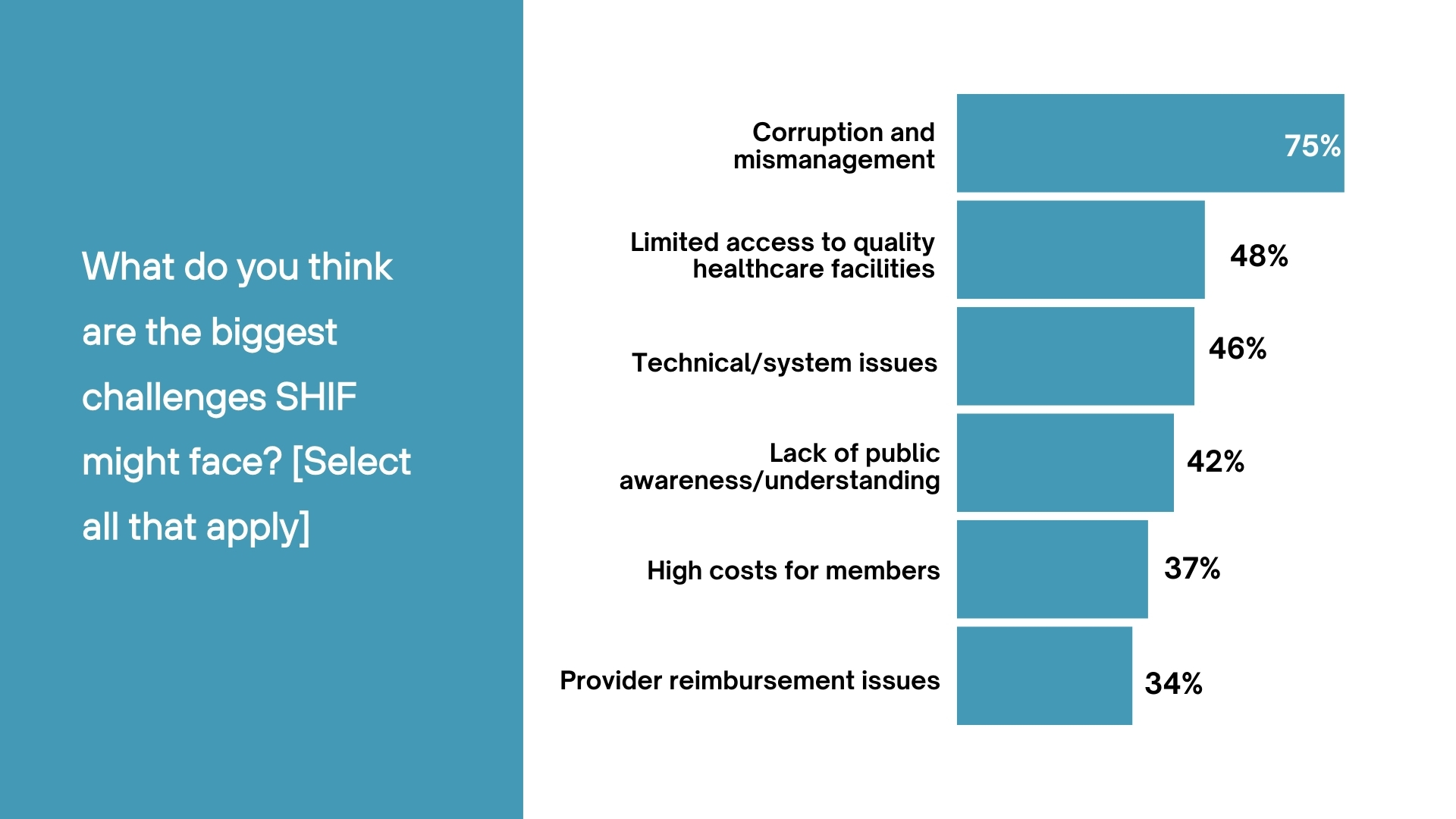
Methodology/About this Survey
This Unique Survey was run through the GeoPoll cell utility between the twentieth February and twenty sixth of February 2025 in Kenya. The pattern measurement was 961, composed of random GeoPoll app customers above the age of 18. Because the survey was randomly distributed, the outcomes are barely skewed in direction of youthful respondents.
GeoPoll is dedicated to supporting well being organizations, NGOs, and governments in future well being challenges. Collectively, we will use knowledge to tell focused interventions, mitigate the influence of public well being crises, and construct extra resilient well being programs for the long run. Our mobile-based surveys supply a novel and tried-and-tested technique to collect insights on illness unfold, public notion, and vaccine hesitancy, particularly in under-resourced areas.
Please get in contact with us to get extra particulars about our capabilities, discover extra on healthcare, or different subjects in Africa, Asia, and Latin America.


















